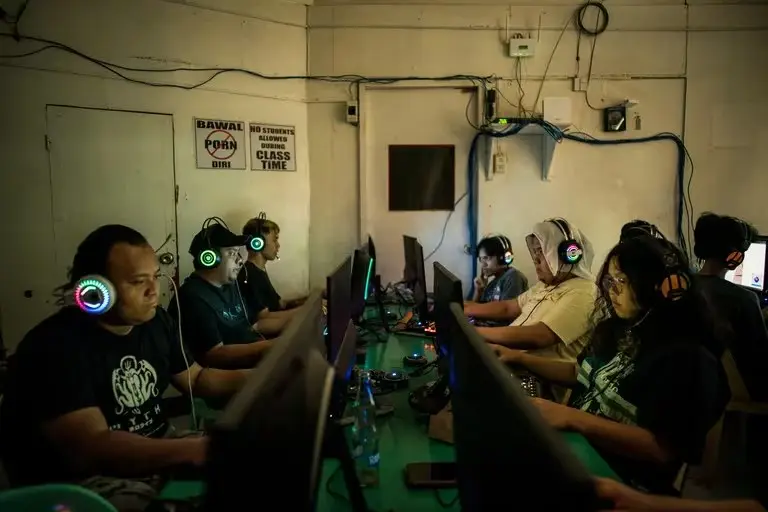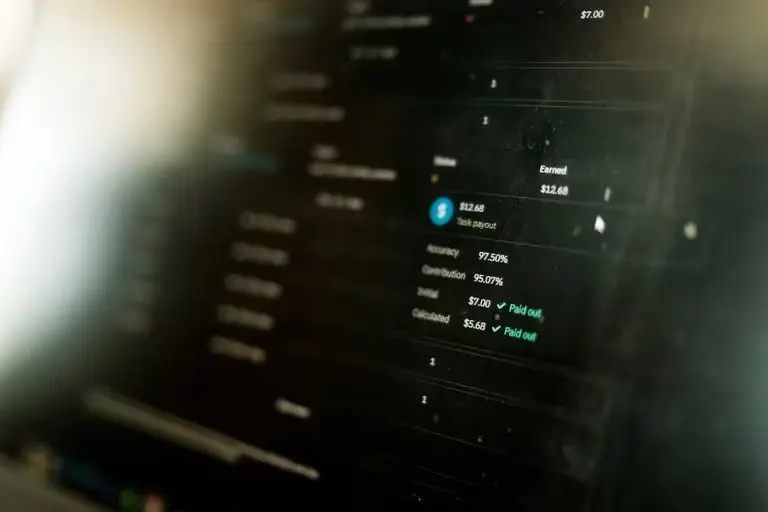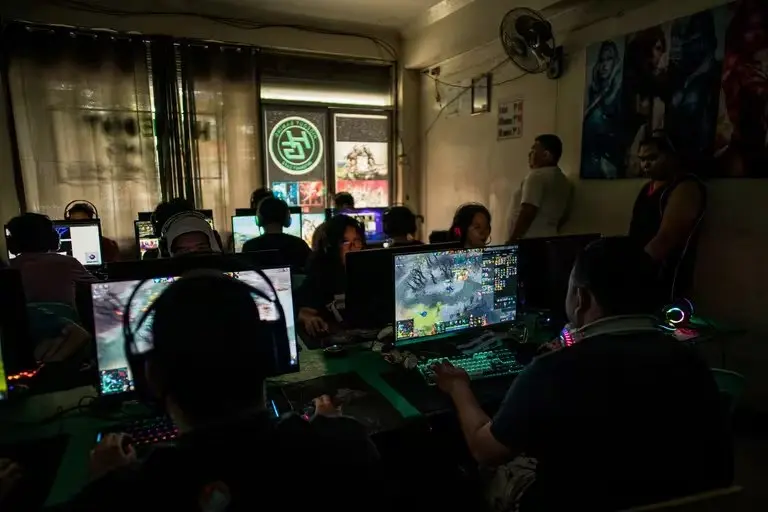The Washington Post
Behind the rise of artificial intelligence is an army of workers in “digital sweatshops”


Internet cafes in the Philippines are now frequented by workers who sort and label data for artificial intelligence models
Remotasks workers say payments, which are due after work is done, are sometimes withheld or delayed without explanation
Thousands of young people in the Philippines toil in labor-intensive, low-regulation work that underpins global technological innovation.
In a coastal city in the southern Philippines, thousands of young workers log on to the Internet every day to support the booming artificial intelligence business.
In dingy Internet cafes, in crowded offices or at home, they take down the masses of data that American companies need to train their artificial intelligence models. Workers differentiate pedestrians from palm trees in videos used to develop self-driving algorithms; they label images so AI can generate depictions of politicians and celebrities; they edit chunks of text to ensure that language models like ChatGPT don’t produce gibberish.
In the Philippines, more than 2 million people are doing this kind of “crowdwork,” according to unofficial government estimates, as part of the vast AI underworld. While AI is often thought of as machine learning without humans, the technology actually relies on the intensive labor of a workforce spread across much of the Global South and often subject to exploitation.
The mathematical models that underpin AI tools are made smarter by analyzing large data sets, which must be accurate, precise, and readable to be useful. Low-quality data produces low-quality AI. So, click by click, a largely unregulated army of humans is transforming raw data into raw material for AI.
In the Philippines, one of the world’s largest destinations for outsourced digital labor, former employees say at least 10,000 such workers are performing this work on a platform called Remotasks, owned by the $7 billion San Francisco startup Scale AI.
According to interviews with workers, internal company messages, payment records and financial statements, Scale AI has paid workers extremely low rates, routinely delayed or withheld payments and provided few channels for workers to have recourse. Human rights groups and labor investigators say Scale AI is one of a number of U.S. companies that have failed to uphold basic labor standards for their overseas workers.
Of the 36 current and former freelancers interviewed, all but two said they had seen their platform payouts delayed, reduced or canceled after completing tasks. The workers, known as “taskers,” said they often earn well below the minimum wage — which in the Philippines ranges from $6 to $10 a day, depending on the region — though they sometimes earn more than the minimum.
Scale AI, which does work for companies including Meta, Microsoft and generative AI companies like Open AI, creator of ChatGPT, says on its website that it is “proud to pay living wage rates.” In a statement, Anna Franko, a spokesperson for Scale AI, said the pay system at Remotasks is “continually improving” based on worker feedback and that “delays or interruptions in payments are extremely rare.”
But on one internal Remotasks messaging platform, which The Washington Post obtained in July, notices of late or missing payments from supervisors were common. On some projects, there were multiple notices in a single month. Sometimes supervisors told workers that payments were being withheld because work was inaccurate or late. Other times, supervisors gave no explanation. According to workers, attempts to track down missing payments often led nowhere or, worse, to the deactivation of their accounts.


Locals play games at an internet cafe in Cagayan de Oro. During the pandemic, dozens of people rented seats here to sort and label data for Remotasks
Smart Ecosystem Philippines Inc.'s facilities in Cagayan de Oro have included a room above a computer equipment store and a narrow five-story building
Charisse, 23, said she spent four hours on a task that was supposed to earn her $2, and Remotasks paid her 30 cents.
Jackie, 26, said she worked three days on a project that was supposed to earn her $50, and received $12.
Benz, 36, said he had racked up more than $150 in payments when he was suddenly kicked off the platform. He never received the money, he said.
Paul, 25, says he has lost track of how much money he is owed in three years of working on Remotasks. Like other current Remotasks freelancers, Paul spoke on the condition that only his first name be published to avoid being kicked off the platform. He started “tasking” full-time in 2020, after graduating from college. He was once excited about helping build AI, he said, but these days, he is mostly embarrassed by how little he makes.
“I know the budget for all this is huge,” says Paul, looking at his hands in a Cagayan de Oro coffee shop. “None of it comes to us.”
Much of the ethical and regulatory debate over artificial intelligence has so far focused on its propensity for bias and its potential to go rogue or be subject to abuse, such as misinformation. But companies producing AI technology are also charting a new frontier in labor exploitation, researchers say.
By recruiting people from the Global South as freelance contractors, microtask platforms like Remotasks bypass labor regulations — such as a minimum wage and a fair contract — in favor of terms and conditions they independently set, said Cheryll Soriano, a professor at De La Salle University in Manila who studies digital labor in the Philippines. “What it boils down to,” she said, “is a complete absence of norms.”
Dominic Ligot, a Filipino AI ethicist, called these new workplaces “digital sweatshops.”
In response to The Post’s findings about Remotasks, Philippine government officials expressed alarm but admitted they were unsure how to regulate the platform. The Department of Information and Communications Technology, which regulates the tech sector, said it did not know how much workers on microtask platforms earn. Data entry is an “informal sector,” said the department’s head, Ivan John Uy. “There are no regulatory safeguards.”
Overseas outposts
Founded in 2016 by college kids and backed by some $600 million in venture capital, Scale AI has emerged as a champion of American efforts in the race for AI supremacy. In addition to working with big tech companies, Scale AI has received hundreds of millions of dollars to label data for the U.S. Department of Defense. To work with such sensitive and specialized data sets, the company has begun seeking more contractors in the United States, though the vast majority of its workforce remains in Asia, Africa and Latin America.
Remotasks says on its website that it has more than 240,000 workers. But in an interview with CNN in June, Scale AI’s 26-year-old CEO Alexandr Wang declined to confirm how many people label data for his company, saying only that he believes in AI that “enables the collective experience of as many people as possible.”
People in the Philippines began working for Remotasks as early as 2017. In 2019, the company incorporated a legal entity in the country called Smart Ecosystem Philippines Inc. (SEPI), according to business registration documents. A year later, as the pandemic sent droves of workers home, Remotasks exploded in popularity.
In the southern region of Mindanao, where decades of political turmoil have left economic opportunities scarce, young people gathered in internet cafes to work on the platform or were recruited by SEPI to work in cramped offices rented from local companies.
In Cagayan de Oro, on Mindanao’s northern coast, SEPI has recruited freelancers to work in at least seven locations. These include a room above a computer equipment store, a narrow five-story building where about 900 workers worked shifts, and the corner space in a shopping mall, still adorned in July with banners advertising an “official training camp” for Remotasks. In 2021, according to financial statements, SEPI paid more than $2 million in rent in the Philippines.
Franko, the Scale AI spokeswoman, said the company created SEPI to operate Remotasks in the Philippines, but declined to provide further details about SEPI’s operations.
Initially, taskers said, they could earn as much as $200 a week. But in 2021, as Remotasks expanded to India and Venezuela, wages plummeted, according to workers and screenshots of assigned projects. Filipino freelancers went from earning $10 a task on some projects to less than 1 cent, according to a former SEPI employee who spoke on condition of being identified by his nickname, Doy, to avoid retaliation from the company.
By auctioning off work around the world, Remotasks has created a “race to the bottom” for wages, said the owner of an outsourcing company that has worked with SEPI. “It’s fierce competition,” said the owner, who spoke on condition of anonymity to protect his business interests.
Raising complaints
When freelancers complete a project, it goes through several levels of review before being evaluated by teams in the United States, officials say. If the work is approved, payments are supposed to be paid to workers through platforms like PayPal. However, payments are sometimes withheld without explanation. And if work is rejected, freelancers may be asked to redo tasks, given “compensation” as low as 2% of the original payment, or not paid at all.
“If you complain and raise your voice even a little, you get deactivated,” says Joseph, a Tasker in Cagayan de Oro. In 2020, he said, he confronted his project manager about the number of tasks he had completed without receiving payment and had his account blocked the next day.
Doy, who until recently worked as one of SEPI’s hundreds of salaried employees, said he and other employees had for years raised complaints from managers with company management and Remotasks executives. Sometimes, Remotasks executives instructed SEPI employees to tell freelancers that the company was working on resolving payment issues, even though it never did, Doy said. Other times, executives told SEPI employees to direct freelancers to Remotasks’ help center, even though it was well known, he said, that “filing a ticket” led nowhere.
Franko said the company offers “multiple channels for questions and support,” including trained specialists who review and respond to payment disputes.
“We have no choice”
Last year, the Oxford Internet Institute, which rates digital labor platforms based on labor standards, singled out Scale AI for “obfuscating” its labor process. In its assessment this year, the institute, which is part of the University of Oxford, gave Remotasks a score of 1 out of 10, failing the company on key metrics such as its ability to fully pay workers.
Jonas Valente, a researcher at Oxford, says Scale AI benefits by offering its clients high-quality data and relegating much of the responsibility and cost of quality control to individual workers. In its terms and conditions, Remotasks says it “reserves the right” to withhold payment, remove freelancers from projects, or deactivate their accounts for work deemed inaccurate. This “unspecified” set of rules, according to Valente, allows the company to decide whether and when to pay them for work, even after it has been performed.
Franko said the company was “disappointed” by the Oxford report. “At Scale, data annotation has always been designed as flexible, gig-based work,” he said. “We are proud of the work opportunities offered at Remotasks.”
Labor groups in the Philippines blame the government for failing to regulate platforms like Remotasks. But officials say they are concerned about stifling such a new industry. Studies by online payment companies and the International Labor Organization (ILO) show that online freelance work is growing faster in the Philippines than almost anywhere else.
Globally, the data collection and annotation industry is expected to reach $17.1 billion by 2030, according to Grand View Research, a market forecasting firm. According to a 2021 ILO study, the vast majority of online freelance work in the world is done by workers in the Global South, nearly half in India and the Philippines alone.
Monchito Ibrahim, a former undersecretary of the Philippines’ Department of Information and Communications Technology, said microtasks “cannot be our future.”
For young people in places like Mindanao who struggle to find work, there are few alternatives. AI at scale can exploit Filipino workers, said Philip Alchie Elemento, 37, a former Tasker, “because they know we have no choice.”
In July, Paul, the Cagayan de Oro Tasker, said he had made the decision to leave Remotasks. He was fed up with not getting paid and distressed by the amount he was taking out of his savings. “I know I deserve much better,” Paul says.
A month later, he was still at Remotasks. He wanted to leave, Paul says. But he didn’t know where to go.
